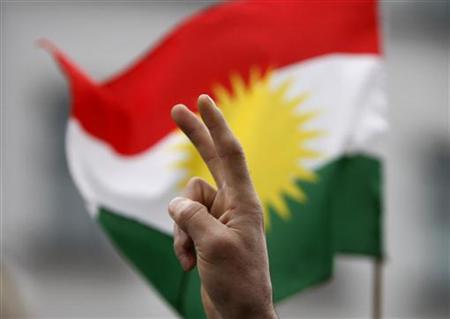LATEST: Police Chief — Islamic State Begins Exporting Oil
Having already made political and military gains in the Iraqi crisis, Kurdistan’s leaders pressed their case for independence on two fronts on Thursday.
In Iraqi Kurdistan, President Massoud Barzani told the Parliament in Erbil that he was no longer bound by the “unity” clauses of the Iraqi Constitution, and asked MPs to prepare for a vote on the right of self-determination: “The time has come to determine our fate and we should not wait for other people to determine it for us.”
Barzani told an interviewer earlier this week:
Independence must be achieved. I believe now the conditions are also favorable for independence. This subject is clear and once achieved, we will help our brethren in Iraq, within our capabilities, to help Iraq maybe surmount the current crisis. But this does not mean that we will set aside the independence of Kurdistan.
See Iraq Interview: Barzani’s Push for Kurdish Independence — “It is Our Natural Right”
In Washington, Barzani’s Chief of Staff Fuad Hussein met US Vice President Joe Biden to put the Kurdish case.
Hussein did not go as far as his boss over independence, although he indicated it might be pursued if talks for a “unity” Government in Baghdad did not succeed:
We are going to give once again a chance to the political process in Baghdad, but we are not going to think that is the only path.
Parallel to that we are going to build ourselves, and we are heading toward exercising self-determination.
So far, the US has been cool towards the Kurdish advance towards independence. Secretary of State John Kerry urged Barzani to exercise caution when he visited Erbil last week, and spokeswoman Jen Psaki said this week, “We’ve been very consistent and clear about our view that a stronger Iraq is a united Iraq, a united Iraq is a stronger Iraq.”
Kurdish forces secured the disputed, oil-rich city of Kirkuk soon after insurgents took Mosul and Tikrit three weeks ago. Kurdistan, after months of an argument with Baghdad over division of oil revenues, has begun selling on its own to customers in Turkey and Israel.
Police Chief: Islamic State Begins Exporting Oil
A local police chief claims that the Islamic State has begun selling oil from a captured field in Salaheddin Province.
Shalal Abul say the group began loading 100 tanks with crude late Thursday from the Ujil field, which produces about 20,000 barrels per day, outside Kirkuk.
“They sell the crude for 12,000 to 14,000 dollars per tank and use the revenues in financing the organization’s operations,” Abul said.
The Islamic State exports the crude via Kurdistan to privately owned refineries, he claimed.
US: No Iraqi Pilots Qualified to Fly American-Supplied F-16s
US officials have responded to Prime Minister Nuri al-Maliki’s complaints that Washington has been slow to deliver F-16 fighter jets
with the claims that no Iraqi pilots have a ualified to fly the aircraft in combat and none will be ready before mid-August.
The officials told The Washington Post that the US is sending hundreds of Hellfire missiles, but only two Iraqi planes — both turboprop Cessnas — can fire them.
Washington has approved the sale of Apache helicopters, which can be equipped with Hellfires, but a State Department official said Iraq had not signed the contract as of January 27, when Congress was notified.
The delivery of the F-16s is further complicated, said the US officials, because their intended destination of Balad Air Base is not secure. Insurgents and Iraqi forces have fought in the area, 40 miles north of Baghdad.

